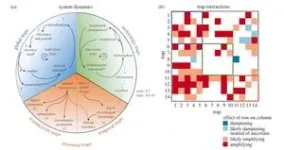(Press-News.org) Low levels of Vitamin D have been shown to be associated with a higher risk of having a cardiac event, like a heart attack or stroke. For this reason, treatment by Vitamin D pills or injections are being investigated as a possible preventative method in these patients.
However, two new studies from Intermountain Health in Salt Lake City have found that current dosing recommendations are not helping patients achieve optimal Vitamin D levels, suggesting that trials looking into the effectiveness of Vitamin D treatment to prevent cardiac events were not using appropriately sufficient doses, leading to inaccurate results.
In their studies, Intermountain researchers found that achieving those levels often takes giving patients much more than the daily United States Recommended Dietary Allowance of 600 to 800 International Units (IU). In some cases, patients needed more than 10,000 IU.
“We’ve seen a series of studies that report an association between low Vitamin D and poor heart outcomes, but also a few randomized clinical trials that do not report the same association,” said lead author, Heidi May, PhD, an epidemiologist at Intermountain Health. “Our findings here show that just giving patients some Vitamin D does not help them achieve optimal levels. If researchers are going to further look at Vitamin D dosing as a possible way to improve heart health, patients need to be given the right doses to reach those ideal levels.”
“These findings show that without taking a tailored approach to evaluating and dosing with Vitamin D, patients most likely will not see any results,” added Viet T. Le, DMSc, PA-C, researcher and physician associate at the Intermountain Health. “We need to be far more intentional in how we’re treating patients with Vitamin D beyond just telling them to take a vitamin pill.”
The findings were presented in two abstract studies at the American Heart Association’s Scientific Sessions 2023 in Philadelphia on November 12 and 13.
Patients in these studies were enrolled in Target-D, a randomized clinical trial evaluating whether achieving an ideal Vitamin D level through personalized management of Vitamin D supplementation will result in the reduction of cardiovascular-related outcomes.
In the first analysis of the Target-D study, 632 patients were stratified into two groups, either receiving a general recommendation to discuss their Vitamin D treatment with their clinician; or a targeted Vitamin D treatment. The goal was to raise their 25-hydroxyvitamin D (25[OH] vit D) levels to more than 40 nanograms per ml (ng/mL), which is considered the optimal level in this study.
For patients in the targeted treatment, their supplementation was based on a dosing algorithm. They returned at three-month intervals for assessment and dosing adjustment, until levels were over 40 ng/mL. If they were above that level, they received no additional treatment and returned annually for reassessment.
Of the 316 treatment participants, nearly 90% required some level of Vitamin D dosing. Of those, 86.5% required more than 2,000 international units (IU) daily and 14.6% required more than 10,000 IU daily. Less than 65% achieved over 40 ng/mL at three months. Another 25% of patients required six months or more of dosing titration.
“Other contemporary Vitamin D studies may have underdosed study participants, which means their results may not be showing the true value of raising someone’s Vitamin D levels,” said Dr. May.
In the second analysis of the Target-D study, the baseline characteristics of study participants are reviewed. All study participants had to have a cardiovascular event within 30 days of study enrollment. The trial will continue until 104 patients have another heart event, or if they die due to heart disease.
Researchers found that baseline Vitamin D levels were a median of 25 ng/mL, less than 20 ng/mL is considered deficient, and between 20 to 30 ng/mL is insufficient. Among those randomized to the treatment arm with a Vitamin D level under 40, 58.5% of patients had a starting Vitamin D dose of 5,000 IU — again, well over the 600 to 800 IU US Recommended Dietary Allowance.
“If Vitamin D can help prevent heart attacks, we want to know it, but our findings are showing that you can’t just tell someone to take a single low supplement dose, then set it and forget it,” said Le. “We need to be more intentional in these trials in order to determine if there is a link between Vitamin D supplementation and improved heart health, as well as how to dose it to help our patients if it does.”
###
END
The ventilation technique, also known as rescue breathing, commonly used during cardiopulmonary resuscitation (CPR) for people with cardiac arrest is often performed poorly by professional emergency responders, and this ineffective strategy is linked to significantly worse patient survival rates, according to a study supported by the National Institutes of Health. Ventilation involves administering breaths to a patient to provide life-sustaining oxygen and inflate the lungs when they stop breathing or during cardiac arrest, when the heart suddenly stops pumping blood. Among the nearly 2,000 ...
The widely available blood thinner apixaban substantially reduced stroke in at-risk patients with a type of atrial fibrillation only detectable by a pacemaker or other implanted cardiac electronic device, a global study has found.
The oral anticoagulant medication, which helps to prevent dangerous blood clots by thinning the blood, reduced the risk of stroke and blood clotting by 37% and reduced fatal or disabling stroke by 49% in individuals with device-detected atrial fibrillation, also known as sub-clinical atrial ...
Familial hypercholesteremia (FH) is an inherited condition that affects about 1 in 250 people, and often shows no signs until they have a heart attack. For individuals with FH the lowering of “bad” cholesterol levels can’t be done by dietary or behavioral changes, the problem is in their genes, and targeted medications therapy is needed.
Now, new research from the Intermountain Health in Salt Lake City has found that genetic screening can identify these patients and make them candidates for treatment that could prevent heart attack, stroke, and death.
“Most of these patients already had tests that ...
New research from Intermountain Health in Salt Lake City finds that genetic screening is effective in identifying patients who have a heart condition known as cardiomyopathy to improve their quality of life and reduce deaths.
By undergoing genetic screening to identity those with the potentially-fatal heart condition, clinicians can more closely monitor them and use medical interventions, when necessary, that could improve the quality of these patients’ lives, and potentially save them, researchers say in a new study of more than 30,000 heart patients.
“Our findings show that we’re ...
SAN DIEGO, CA, NOVEMBER 12, 2023 — A recent study from Hospital for Special Surgery (HSS) and others has found a correlation between obesity and more severe disease flare symptoms that negatively affect quality of life in patients with early rheumatoid arthritis (RA), a systemic, autoimmune, inflammatory disorder affecting multiple joints in the body. The study will be presented at ACR Convergence 2023, the annual meeting of the American College of Rheumatology.
RA is usually treated with a combination of medications to relieve swelling and pain while regulating the immune ...
About The Study: Self-monitoring and physician-guided titration of antihypertensive medications was associated with lower blood pressure during the first nine months postpartum than usual postnatal outpatient care in this randomized clinical trial involving 220 participants in the United Kingdom.
Authors: Paul Leeson, Ph.D., of the University of Oxford in Oxford, United Kingdom, is the corresponding author.
To access the embargoed study: Visit our For The Media website at this link https://media.jamanetwork.com/
(doi:10.1001/jama.2023.21523)
Editor’s ...
· High blood pressure is the leading cause of morbidity and mortality
· Losing one teaspoon of salt a day results in systolic blood pressure decline comparable to effect achieved with drugs
· First study to show people already on blood pressure medication could further lower their blood pressure by reducing sodium
Chicago --- Nearly everyone can lower their blood pressure, even people currently on blood pressure-reducing drugs, by lowering their sodium intake, reports a new study from Northwestern Medicine, Vanderbilt University Medical Center and the University of Alabama at Birmingham.
“In the study, ...
About The Study: Dietary sodium reduction significantly lowered blood pressure in the majority of middle-aged to elderly adults in this study including 213 participants. The decline in blood pressure from a high- to low-sodium diet was independent of hypertension status and antihypertensive medication use, was generally consistent across subgroups, and did not result in excess adverse events.
Authors: Deepak K. Gupta, M.D., M.S.C.I., of the Vanderbilt University Medical Center in Nashville, is the corresponding author.
To access the embargoed study: Visit our For The Media website at this link https://media.jamanetwork.com/
(doi:10.1001/jama.2023.23651)
Editor’s ...
About The Study: This randomized clinical trial found that in patients with advanced heart failure treated with a fully magnetically levitated left ventricular assist device, avoidance of aspirin as part of an antithrombotic regimen, which includes a vitamin K antagonist, is not inferior to a regimen containing aspirin, does not increase thromboembolism risk, and is associated with a reduction in bleeding events.
Authors: Mandeep R. Mehra, M.D., M.Sc., of Brigham and Women’s Hospital and Harvard Medical School in Boston, is the corresponding author.
To access the embargoed study: Visit our For The Media website at this link ...
According to the American Medical Association, approximately 25% of all patients used telehealth services during the last year, exceeding the 5% who accessed their care this way before the pandemic.[1] The American Heart Association (AHA) Center for Telehealth, unveiled today, recognizes the critical role telehealth can play as a solution to close gaps in health care access, particularly in rural and underserved areas, and deliver quality care to populations that have little to no access to traditional ...




